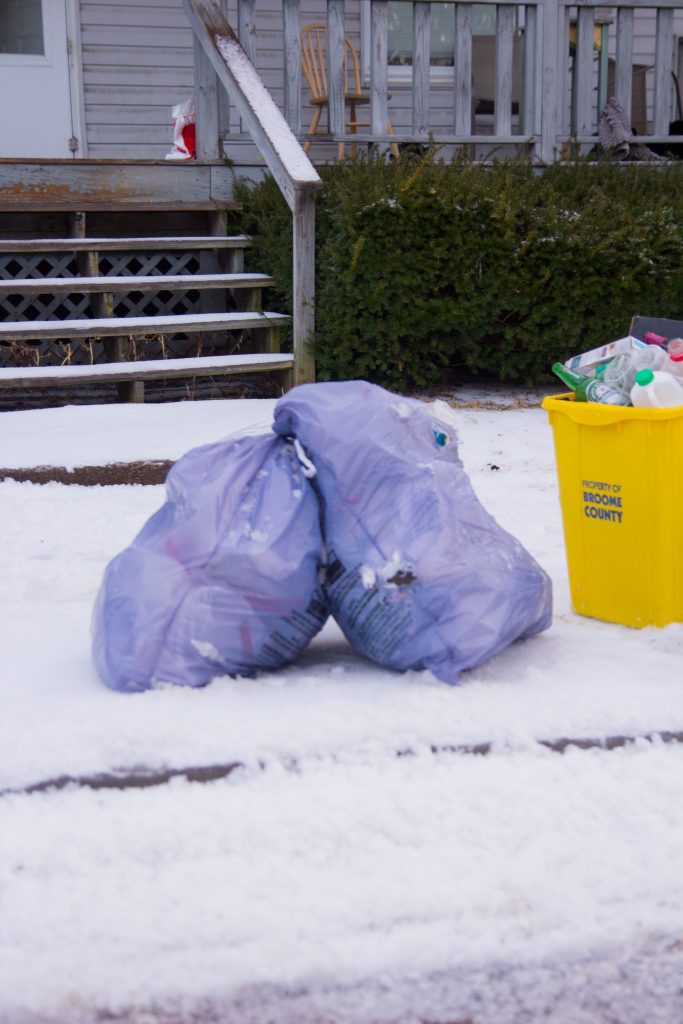
Binghamton averages 170 tons of garbage a week, all of which must be placed in city-mandated blue bags. But the policy, which started in 1991 as a way to encourage residents to recycle, puts the economic burden of trash collection on those living within city limits, including Binghamton University students.
The garbage that is produced in the city goes to the Broome County Landfill in Binghamton, and in order to use the facility, the city is required to pay a “tipping fee” of $45 per ton of garbage. According to Bernice St. Clair, acting commissioner of public works in the city of Binghamton, the tipping fee used to be part of property taxes, but the installation of the blue-bags policy ended this practice, as money raised from residents purchasing blue bags underwrites the landfill expenses.
Under the former system, which used property taxes to cover the tipping fee, property owners, including landlords, covered the costs of trash disposal, and renters, including student residents, did not have to pay to dispose of their waste. By instituting the policy, the cost was passed from property owners to renters.
“When recycling started in 1991, the city eliminated the tipping-fee tax included on everyone’s property tax bill that was based solely on assessment,” St. Clair wrote in an email. “Instead, the city went to the bag system, which charges residents for the amount of garbage they actually generate.”
If residents do not use the blue bags, which can be purchased in medium and large sizes at stores like Wegmans and CVS, for their trash, garbage collectors will not pick it up. Jared Kraham, executive assistant to the mayor of Binghamton, said the program has helped offset the city’s payment for refuse collection, which includes the collection of trash, recyclables, yard waste and bulk items. Although the blue-bag system covers the expenses of the tipping fee, other trash-disposal costs still come from property taxes.
“Taxpayers actually subsidize the cost,” Kraham said. “The sale of bags is budgeted revenue at $1.05 million, as part of a $3.7 million budget.”
Tyler Miller, a senior majoring in computer engineering, said he generally supports the program because it helps reduce economic strain on the city of Binghamton. However, he noted he doesn’t have to pay for these types of bags at home.
“I feel like it’s a good idea — it sets a standard for the city and provides a source of revenue for the city,” Miller said.
But some students feel they should not have to pay the costs of the tipping fee, especially since many live with multiple roommates, increasing the amount of trash they produce each week. Trevor Matuszyk, a junior majoring in computer science, estimates that he spends between $7 to $10 a week on blue bags for his five-person house, and said he doesn’t have to pay for these types of bags in his hometown of Conklin, New York.
“I think it’s a waste of money,” Matuszyk said. “They’re not worth more than any other Hefty bag. They’re of similar quality of any other bag. I’ve had them rip on me several times.”
Matthew Sullivan, a junior majoring in economics, said he pays about $12 per week for the bags. At home, he said the garbage collectors come three times per week, and he doesn’t have to use special bags. In Binghamton, his trash is picked up once during the week, and he said he is frustrated with paying for the bags when he gets less service than he does at home.
“I feel that they are unnecessary — the cost is too high and they are, overall, useless,” Sullivan said. “They’re inefficient.”


